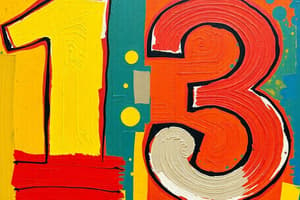Podcast
Questions and Answers
What does the word 'similar' most closely refer to in the context provided?
What does the word 'similar' most closely refer to in the context provided?
- Different
- Alike (correct)
- Identical
- Unique
Which relative pronoun would correctly complete the sentence: 'The house ___ he bought is very large.'?
Which relative pronoun would correctly complete the sentence: 'The house ___ he bought is very large.'?
- when
- which (correct)
- where
- who
In terms of the pronunciation of their final sounds, which group contains words pronounced with the ending /SZIZ/?
In terms of the pronunciation of their final sounds, which group contains words pronounced with the ending /SZIZ/?
- dresses, photographs, superstitions
- superstitions, dresses, trousers (correct)
- trousers, clothes, photographs
- clothes, trousers, superstitions
What kind of meaning does the context suggest the 'poor' individuals convey through their appearance?
What kind of meaning does the context suggest the 'poor' individuals convey through their appearance?
What is implied about the relationship between appearance and emotional state in the passage?
What is implied about the relationship between appearance and emotional state in the passage?
What is the primary reason people believe in superstitions?
What is the primary reason people believe in superstitions?
Which ancient civilizations are mentioned as having their own superstitions?
Which ancient civilizations are mentioned as having their own superstitions?
What belief is associated with breaking a mirror?
What belief is associated with breaking a mirror?
Why do many buildings in the United States omit the 13th floor?
Why do many buildings in the United States omit the 13th floor?
How does the belief in numbers vary between Chinese culture and Western culture?
How does the belief in numbers vary between Chinese culture and Western culture?
What is typically associated with a newly married couple in some cultures?
What is typically associated with a newly married couple in some cultures?
Which day is generally regarded as unlucky due to superstition?
Which day is generally regarded as unlucky due to superstition?
What is the underlying cause for the variety of superstitions around the world?
What is the underlying cause for the variety of superstitions around the world?
Flashcards are hidden until you start studying
Study Notes
Superstitions
- Superstitions are illogical beliefs or practices based on fear or ignorance.
- They are often associated with good luck, bad luck, or controlling the unpredictable.
- Superstitions have deep historical roots and have evolved over time.
- Ancient civilizations, like the Egyptians and Greeks, had their own superstitions.
- Some of these ancient beliefs influence modern superstitions.
Examples of Superstitions
- Finding a four-leaf clover brings good luck.
- Breaking a mirror brings seven years of bad luck.
- Walking under a ladder brings bad luck.
- Throwing rice over a newly married couple brings wealth and happiness.
Cultural Differences in Superstitions
- Black cats can be symbols of good or bad luck depending on the location.
- The number 13 is considered unlucky in many Western countries, with buildings often skipping floor 13.
- Friday the 13th is considered an unlucky day, with avoidance of significant events like weddings or business launches.
- In China, the number 4 is considered unlucky because it sounds like the word "death".
- In China, the number 8 is considered lucky because it sounds like the expression "make money".
Comprehension Questions
- Superstitions have been a part of human culture for centuries - True
- Superstitions are based solely on scientific evidence - False
- Finding a four-leaf clover is believed to bring good luck - True
- Breaking a mirror is thought to bring three years of bad luck - False
- Paragraph 1 mentions the history and origin of superstitions.
- Paragraph 2 mentions examples of superstitions around the world.
- Paragraph 3 mentions cultural differences in superstitions.
- Some superstitions associated with marriage in different cultures include:
- Throwing rice over newly married couples for wealth and happiness.
- The word They in §1 refers to superstitions.
- The word It in §3 refers to throwing rice over a newly married couple.
Text Exploration Answers
- Similar (§1) = Alike
- Man-made (§4) = Artificial
- Noun - Adjective
- Superstition - Superstitious
- Culture - Cultural
- Belief - Believable
- Ignorance - Ignorant
- Luck - Lucky
- Who - used for people
- Which - used for things
- Where - used for places
- When - used for time
- /SZIZ/
- Photographs
- Superstitions
- Clothes
- Trousers
- Dresses
- The way we look tells other people a lot about us. Our clothes can even tell if we are happy or sad. Psychologists think that looking bad, dressing badly, forgetting about our hair and so on, is one of the signs of depression. They tell also how much money we have. The rich always wear very expensive jeans, but the poor put on modest dresses.
Studying That Suits You
Use AI to generate personalized quizzes and flashcards to suit your learning preferences.





